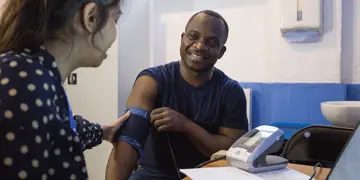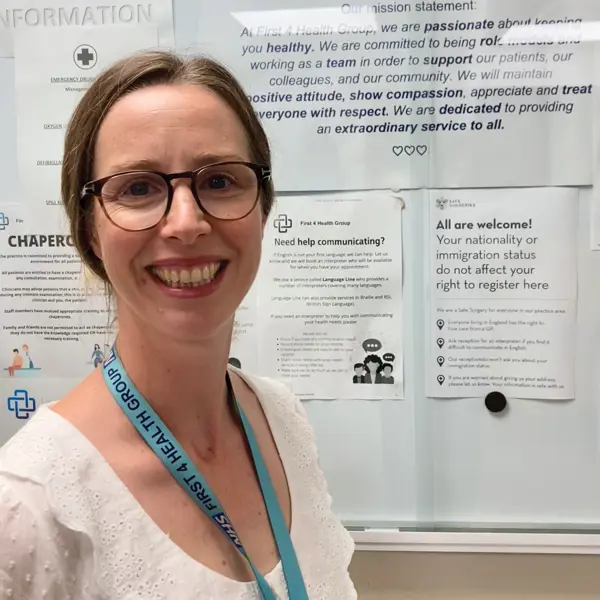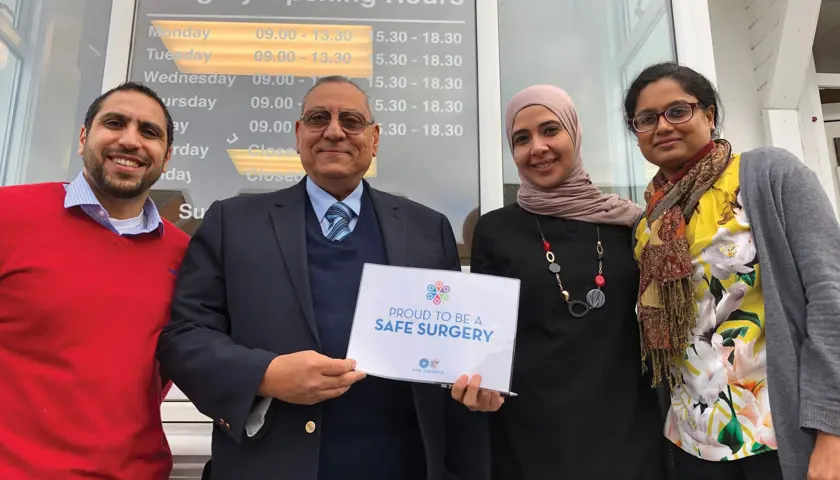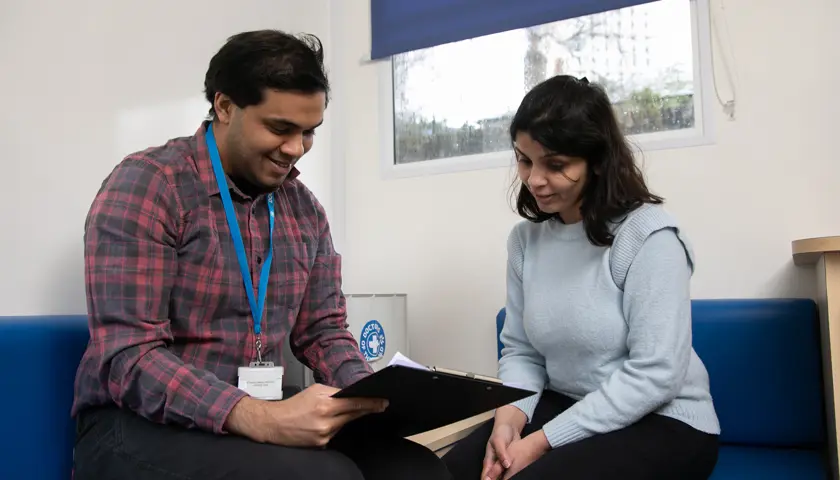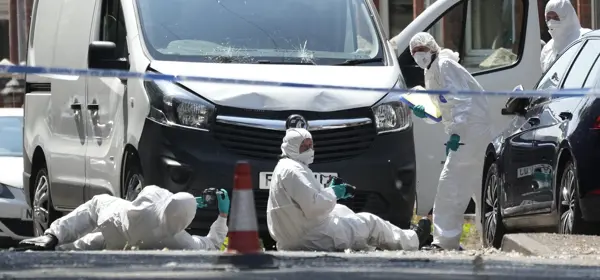Right to care
Right to care
Refugees and asylum seekers are often wrongly turned away from primary care because they lack proof of ID and address. Seren Boyd reports on a scheme which makes it easier for them to register
Cat waited for as long as she could. She had not slept, worried her feverish baby might die in the night.
The receptionist at the local GP surgery was adamant, though, despite her pleas: they couldn’t register her or her eight-month-old daughter without proof of ID or address. No, she couldn’t see a doctor. Cat left in tears.
They had not needed a doctor before, not even after armed men attacked their village back home, forcing them to flee the country and seek sanctuary in London.
‘I was seeing people dying to my front, to my left,’ recalls Cat. More than a decade on, the memories are still suffocating. ‘I ran but kept falling: I don’t know how I managed to keep hold of my daughter. I still haven’t heard from my sister.’
Cat used to pray she and her daughter wouldn’t get sick while their asylum claim in the UK was being processed: she didn’t want to ask for help, for fear of being sent back.
If people are refused access to healthcare once, they often don’t try again
Marina Davidson
When her baby did fall ill, and she was refused GP registration, she turned to the church who had supported her. Her minister wrote to the surgery, confirming Cat’s asylum status and her temporary address: for a long time, she relied on different friends for accommodation.
The GP who eventually saw the child apologised for the wait.
Later, when Cat moved area and had to register with a different GP, she was asked again for proof of ID and proof of address.
Cat delayed seeking a GP appointment for herself for much longer. By then, her blood pressure was sky-high.
‘The doctor’s mouth was open. “Madam, where have you been? Why haven’t you been to the doctor?” If my daughter didn’t fall sick, I wouldn’t have gone. Maybe I would have been dead by now.’
She has been in the UK for years now but has yet to be granted indefinite leave to remain. Cat is not her real name.
Proof of address
NHS England guidance is clear that immigration status has no bearing on a patient’s entitlement to register with a GP surgery and access primary care services without charge. It explicitly states that lack of proof of identity and address are not ‘reasonable grounds’ for refusing to register a patient.
Yet, many surgeries in England still refuse registration and make proof of address and ID a prerequisite for sign-up, according to humanitarian charity DOTW (Doctors of the World).
The Bureau of Investigative Journalism found 62 per cent of GP surgeries they surveyed in 2021 in 10 locations across the UK would not register a patient without proof of address, proof of ID or legal immigration status.
Part of the problem may be confusion on reception desks with NHS guidance and differences in policy between primary and secondary care. In England, patients who are not classified as ‘ordinarily resident’ may be charged for secondary care services, unless they are refugees or asylum seekers with an active application or appeal (or if other exemptions apply). Entitlement differs in other parts of the UK too (see BMA website, details on page 7).
DOTW insists there are many other barriers which undermine people’s ability and confidence to access healthcare they have a right to, and not all of them are obvious.
This summer’s anti-immigration riots – purloining the previous Government’s ‘Stop the boats’ slogan – have reinforced many people’s fear and sense of insecurity, says Marina Davidson, DOTW primary care lead.
‘If people are refused access to healthcare once, they often don’t try again, or they’re too afraid to try at all,’ she says. ‘Either way, it has a profound effect on their mental health and they may end up with serious health issues or in A&E, all of which could have been prevented.
‘Many living in the UK fall through the cracks of our NHS systems, struggle with their health alone, and do not show up in public health and service data.’
Newham in East London is one of the UK’s most diverse and deprived boroughs, with a high population turnover. It’s still waiting for its Olympic legacy, despite hosting London 2012.
The borough has been home to several asylum-seeker hotels since COVID and has a great deal of dispersal accommodation.
Many living in the UK fall through the cracks of our NHS systems
Marina Davidson
Last month, Newham Council said spending on temporary accommodation for homeless households was pushing it towards the brink of bankruptcy.
Lucy Langford is a local GP and, in her capacity as health equity fellow for the Newham Training Hub, has encouraged all 46 general practices in the borough to join the Safe Surgeries initiative run by DOTW, which the BMA also endorses.
This means practices not only comply with NHS policy on patient registration but also commit to proactively dismantling barriers that prevent access. To this end, Safe Surgeries provides training for practice teams, a toolkit of resources – from at-a-glance guidance for reception staff to patient-facing information in different languages – and a ready-made community of inclusion champions.
In Newham, fruitful partnerships with public health, DOTW and the voluntary sector, consolidated during the pandemic, are helping primary care teams identify and reach out to those as yet unregistered with a GP.
Dr Langford is passionate about this work and insists that GP surgeries have no excuse for not registering local people, including vulnerable migrants. But she understands why some may baulk.
Some asylum seekers and refugees often have complex needs, she says: they may need double appointments, interpreters and specialist services for trauma, unmonitored conditions or interrupted care. The housing crisis in Newham is also taking a particular toll on health and GPs’ workload. Dr Langford’s training did not prepare her for this work.
‘We tried having one of my clinics just to see new hotel residents but we could have filled it 10 times over and it was very challenging,’ she says.
‘We might be emailing housing, the Home Office or trying to chase up outpatient stuff – and often being ignored. The resources for GP teams and our patients just aren’t there.’
Dr Langford feels intensely the pressure of trying to contain patients’ care within the primary setting, to protect them from bills they cannot afford. Debts to the NHS in secondary care are reported to the Home Office and can affect immigration applications, something DOTW is still campaigning against. Yet, sometimes patients’ clinical needs are such that Dr Langford has no option but to refer.
The resources for GP teams and our patients just aren’t there
Dr Langford
‘Someone with a complex condition which hasn’t been monitored for several years, I’d normally refer to the specialty team, but then they might get charged. These are the patients I go to bed thinking about.’
While her practice received some LES (local enhanced service) funding for registering patients from asylum seeker hotels, it wasn’t enough to cover thorough initial health checks and screening, Dr Langford says. Thankfully, North-East London ICB (integrated care board) is now introducing an outreach service to provide these checks.
‘Most GPs want to help disadvantaged patients like these but the current funding equation and support available for primary care just aren’t enough,’ she says.
Spreading the word
Recently, DOTW passed a significant milestone, registering its 2,000th Safe Surgery in England.
The heat map of sign-ups shows high concentrations in London, Manchester, Birmingham and West Yorkshire, areas where it has worked with champions such as Dr Langford.
For example, West Yorkshire ICB has been promoting Safe Surgeries to general practice for some time now and this year it is asking all GP surgeries in Leeds to sign up as part of its ‘Resilient practice’ scheme.
The scheme is part of the ICB’s local investment: practices receive funding as an incentive and the ICB provides follow-up support.
Yet, Safe Surgeries’ 2,000 sign-ups represent only about a third of general practices in England. Marina feels it should not fall to a charity such as DOTW to ensure surgeries are complying with NHS England guidance – just as health professionals should not be made to feel responsible for charging for care or information-sharing.
The new ‘Register with a GP surgery’ online service being rolled out by NHS Digital – taking patient registration online and clarifying who can register – may help break down barriers, although it won’t help the many with limited internet access or IT literacy.
Something as simple as a poster in reception, a clear statement on the website, telling people in different languages ‘Don’t have documents? Don’t worry…’ can make a sizeable difference, says Marina.
‘Registering them with a GP is part of welcoming people, connecting them to the system and community. It’s a very basic thing with a huge impact.’
Summer riots
The background hum of anti-migrant narratives has been unsettling for many. But it has made others even more determined to stand up for health inclusion. Marina has had emails from primary care staff saying the riots this summer have spurred them on to register as Safe Surgeries and ‘take a stand’ against intolerance.
Laura Dinsley, manager of primary care integration for Leeds, West Yorkshire ICB, feels the same: ‘We felt this was important given Leeds’ population and with the recent issues we’ve seen up and down the country, including in Leeds, we feel even more so now that it’s so important not to have barriers to healthcare.’
If we don’t have proper, inclusive registration, we can’t know what people’s needs are
Dr Langford
Cat now works alongside DOTW as an advocate for her community. ‘Before, when I couldn’t register, I felt like I wasn’t recognised as a human being,’ she says. ‘Now, the doctor I’ve been seeing speaks to me calmly, doesn’t rush me. He takes my health seriously, just like everyone’s should be.’
Despite all the pressures, Dr Langford is still committed to promoting inclusive patient registration. It’s the only way of identifying and understanding the needs of the most vulnerable in a community – and being able to advocate for them effectively, she says.
‘If we don’t have proper, inclusive registration, we can’t know what people’s needs are. How do we hear their voices? If everyone was registered, the insights we would get, the political power, would be huge.’
More information on refugees’ and asylum seekers’ entitlement to NHS care
Learn more about Safe Surgeries
(Picture credit: Doctors of the World)


